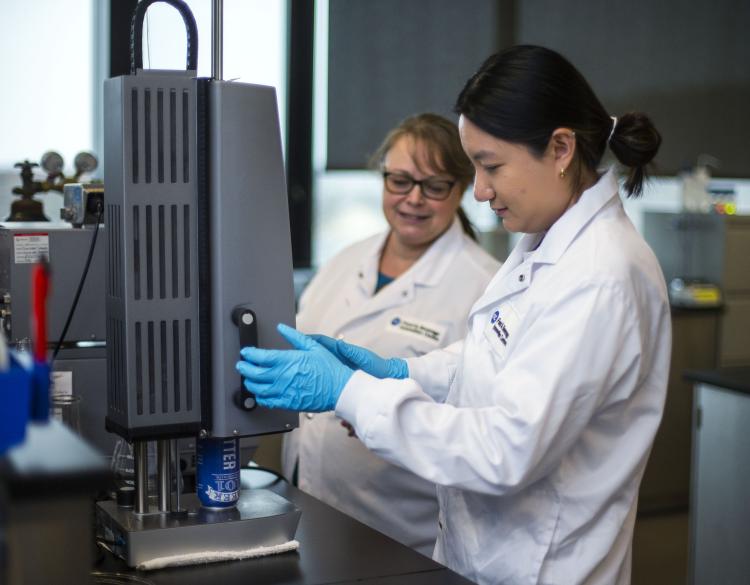With the craft beer industry becoming a staple in Canada's economy, Niagara College (NC) has taken a leading role in ensuring quality and consistency across the sector. To address the need for ongoing quality assurance, NC assembled a team of industry and academic partners to establish the Canadian Craft Brewery Quality Program.

Food and Beverage Innovation Centre staff working in the beverage analysis lab testing craft beer quality.
Developed in partnership with three other colleges (Durham College, Collège Communautaire du Nouveau-Brunswick's CCNB-INNOV, and Olds College of Agriculture & Technology), three provincial craft beverage associations (Ontario Craft Brewers, Alberta Small Brewers Association, and Craft Alcohol New Brunswick); and 17 brewery partners, the program was funded with $1,789,330 over two years by the Natural Sciences and Engineering Research Council of Canada (NSERC) through the Applied Research and Technology Partnership (ARTP) program.
The Canadian Craft Brewery Quality Program is designed to support breweries of all sizes in maintaining high standards. It offers a solution that is approachable, can be customized for each brewery, allows for adaptability in a constantly changing regulatory environment, and most importantly, was developed in collaboration with industry experts and craft brewers themselves. The program also provides a series of building blocks and tools that brewers can use to develop and implement their own customized Quality Management System, or QMS. These resources include an action list, brewery process flow chart, gap assessment, quality guidelines, forms, and standard operating procedures.
"Through ongoing communication with our industry partners, our team has listened and clearly understands that one of the ways we can help most is by taking the lead in developing a comprehensive quality program that can be adopted by industry; one that is developed by impartial third-party experts, and that is designed in a manner that can be owned and administered by the industry itself," said Lyndon Ashton, Niagara College's Associate Director, Economic Development and Planning, Research and Innovation. "This program represents a vital step forward that will drive capacity building at all levels within the operation resulting in tangible impacts that will inevitably translate into increased consumer confidence and market growth."
To celebrate the success of this program, a series of videos featuring each college partner and some of their respective breweries was developed to showcase how they participated in the creation of the program. In addition, a summary video highlighting the overall program and how it will impact breweries and provincial associations was developed.
To test the program out, each project team at the respective college worked with craft breweries in their communities. They started with initial gap assessments, drafted their customized programs, and then breweries had six to nine months for implementation, with ongoing support from the colleges.
As a result of the program, craft breweries are experiencing increased efficiencies, cost savings, and improved quality and consistency. Staff training has been greatly simplified now that they have defined systems and Standard Operating Procedures (SOPs), and they are well positioned for future regulatory changes and growth.
Back in 2018, NC's Food and Beverage Innovation Centre undertook an Ontario Craft Brewery Quality Review, examining 173 craft beers from 27 styles at two-points-in-time, to evaluate basic analytics and quality. The results highlighted the need for in-place quality programming at craft breweries. Making a consistent high-quality beer is more important than ever in this climate of increasing inflationary and supply chain cost issues especially for smaller-scale craft breweries.
Many students from academic programs worked as Research Assistants alongside these partners and received valuable work-integrated learning and capacity building for their future careers. For example, at NC, students from the Brewmaster and Brewery Operations Management Program and School of Business and Management worked on this project. Ultimately, the intellectual property has been assigned to each provincial association and they will decide how to make the program available, so it is best suited for their brew members. Craft breweries are encouraged to reach out to their association to see how they can implement this program in their business.
Videos:












